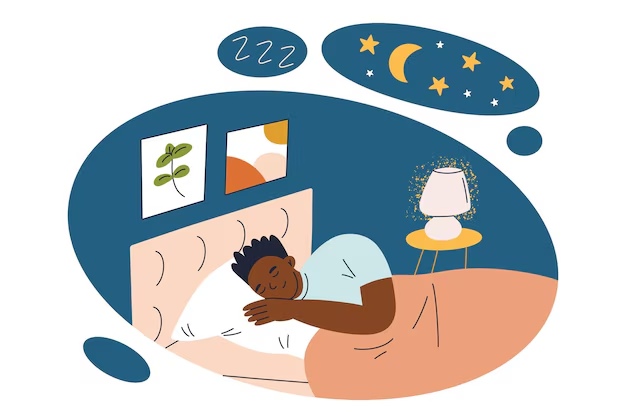A restful night’s sleep begins long before you get into bed. How you spend your evenings has a direct effect on the quality of your sleep, your mood the next day, and your overall wellbeing. Simple, practical changes to your evening routine can create a calmer atmosphere, reduce stress, and help your body naturally prepare for restorative sleep.
Understand The Connection Between Evening Habits And Sleep
Our modern lifestyles often involve late-night screen time, heavy meals, and stressful activities that disrupt natural sleep patterns. According to sleep experts, the body’s circadian rhythm, which regulates sleep and wake cycles, responds to environmental cues such as light, temperature, and routine.
Even small evening habits can either support or interfere with this rhythm. For example, bright screens late at night suppress melatonin, the hormone that signals to your body that it is time to sleep. Similarly, caffeine or heavy meals too close to bedtime can delay falling asleep or cause restless nights.
Start Wind-Down Rituals Early
Creating a wind-down routine allows your body and mind to transition smoothly from the busyness of the day to relaxation. Here are practical ways to begin:
- Set a consistent bedtime: Going to bed at roughly the same time each night trains your body to sleep more naturally.
- Dim the lights: Lower lighting in the evening signals to your brain that the day is ending.
- Engage in calming activities: Reading a physical book, gentle stretching, or listening to soft music can help reduce stress.
Even dedicating 30 to 60 minutes to a wind-down routine can significantly improve sleep quality over time.
Limit Screen Time And Blue Light Exposure
Electronic devices emit blue light, which interferes with melatonin production. Reducing screen exposure in the hour or two before bed can make falling asleep easier.
- Avoid scrolling social media or watching TV late at night.
- Use night mode or blue light filters if you must use devices.
- Consider reading a book or listening to a podcast instead.
Practical example: Many people find replacing one hour of screen time with reading or journaling can calm the mind and promote a sense of closure for the day.
Mindful Evening Practices
Mindfulness before bed can help quiet racing thoughts and improve relaxation. Simple techniques include:
- Breathing exercises: Inhale slowly for four counts, hold for four, exhale for four, and repeat.
- Guided meditation: Apps or audio tracks can lead you through relaxation exercises.
- Reflective journaling: Write down any lingering worries or tasks for tomorrow, then set them aside.
These practices reduce stress and create a sense of mental clarity that supports deeper sleep.
Adjust Evening Nutrition And Hydration
What you eat and drink in the evening can affect your sleep quality. Consider these practical strategies:
- Avoid heavy meals close to bedtime: Large, rich meals can cause indigestion and disrupt sleep.
- Limit caffeine and alcohol: Both can interfere with natural sleep cycles, even if alcohol initially feels relaxing.
- Hydrate earlier in the evening: Drinking too much right before bed may lead to waking during the night.
Opt for light, easily digestible snacks if needed, such as a small bowl of oats, a banana, or herbal tea. Chamomile or peppermint tea can be particularly calming.
Create A Restful Bedroom Environment
Your sleep environment plays a crucial role in how quickly you fall asleep and how deeply you rest. Small changes can make a big difference:
- Maintain a cool, comfortable temperature: Around 18 to 20 degrees Celsius is ideal for most people.
- Reduce noise and light: Blackout curtains, eye masks, or white noise machines can help.
- Reserve the bed for sleep: Avoid using your bed for work or prolonged screen time.
A serene and uncluttered bedroom signals your body that it is time to relax and supports a calmer mind.
Incorporate Gentle Evening Movement
Light physical activity in the evening can help release tension accumulated during the day. Gentle movement, rather than intense exercise, is key:
- Short evening walks
- Gentle yoga or stretching
- Relaxing bodyweight exercises
Avoid high-intensity workouts immediately before bed, as they can temporarily increase adrenaline and make it harder to fall asleep.
Manage Stress And Mental Overload
Evening stress often prevents falling asleep or causes restless nights. Practical strategies include:
- Make a to-do list for tomorrow: Offloading tasks reduces mental clutter.
- Practice gratitude: Writing down three positive things from the day fosters a calm and content mindset.
- Limit stimulating conversations or news consumption: These can trigger stress or overthinking.
By proactively managing stress, you give your mind the chance to rest and recover overnight.
Establish A Consistent Wake-Up Routine
Evening habits are more effective when paired with a consistent morning routine. Waking at the same time each day reinforces your body’s natural rhythm, making it easier to fall asleep at night. Exposure to natural daylight in the morning also helps regulate circadian rhythms.
Conclusion
Making evenings calmer and improving natural sleep quality is achievable with small, intentional changes. From adjusting lighting and reducing screen time to practising mindfulness, managing stress, and creating a sleep-friendly environment, every choice contributes to better rest. These strategies are not about perfection but about consistent, practical steps that gradually support deeper, more restorative sleep.
By prioritising a calm evening routine, you set the stage for better energy, mood, and focus during the day, creating a sustainable cycle of wellbeing.


